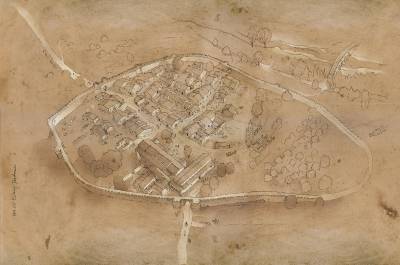Urban landscape of power in the Iberian Peninsula from Late Antiquity to the Early Middle Ages (ULP.PILAEMA)

Summary
The importance of power as an agent of social, economic and material changes in landscapes had relevant consequences across times and places, which pervade all levels of society. The research project ‘Urban landscape of power in the Iberian Peninsula from Late Antiquity to the Early Middle Ages’ (ULP.PILAEMA), seeks to examine the role of governance (civil and religious local powers) in the history of the late antique and early medieval Iberian cities and the types and models of landscapes generated after the fall of the Western Roman Empire.
Interdisciplinary research methodology will be undertaken with the integration of different fields including archaeology, history, and other disciplines useful to developing understanding of urban settlements to establish a ‘geography of power’ between the 5thand 8thcenturies.
Context and key objective
This project is articulated around six key case studies from Spain and Portugal selected for their actual and potential contribution to offer a more secure image of architecture and topography throughout Late Antiquity (Barcelona, Toledo, Recopolis, Idanha-a-Velha, Valencia and Oviedo).
The general goal is to explore the ways in which topographies of governance were configured and to identify urban patterns comparing with other representative examples in Western Europe linked to the news Anglo-Saxons, Visigoths and Merovingian kingdoms.
Landscape archaeology will be the theoretical and methodological framework used to carry out this project, while the main methods draw from archaeological survey, comprising computer based mapping and remote sensing technology. Thus topics covered in this proposal include the Christianization process, plurality of past societies, urbanism, privileged architecture, governance and Geographical Information Systems applied to the study of archaeological data.
Research questions
There are some historiographical discussions and issues that need a set of hermeneutical tools to comprehend and trace changing landscape. Research questions to be addressed in my project comprise:
- to recognise and contradistinguish the impact of Romans, Visigoths, Merovingians and Anglo-Saxons elites in the West landscapes
- to generate archaeological knowledge about interactions and networks between those new kingdoms
- the role of secular power and the Church in the formation of late antique cities and landscapes
- relevance of powerful architecture to manipulate settlements and design new landscapes
- to understand the formation of medieval social and individual identity.
Media links
- Museo Arqueológico Nacional de Madrid (National Archaeological Museum, Spain)
http://www.man.es/man/actividades/cursos-y-conferencias/20191001-actualidad-arqueologica-2/20191029-los-hitos.html - Fundación Palarq, Paleontología y Arqueología
https://fundacionpalarq.com/los-hitos-el-yacimiento-de-la-aristocracia-visigoda-en-toledo/ - El País, 28th October 2019 (Spanish National Press)
Orgaz desentierra su ciudad visigoda
https://elpais.com/cultura/2019/10/15/actualidad/1571132594_958206.html#comentarios - BAR International Series (Oxford Publishing)
https://www.barpublishing.com/de-ciuitas-igaeditanorum-a-ladaniyya.-paisajes-urbanos-de-idanha-a-velha-portugal-en-epocas-tardoantigua-y-medieval.html
 Close
Close

